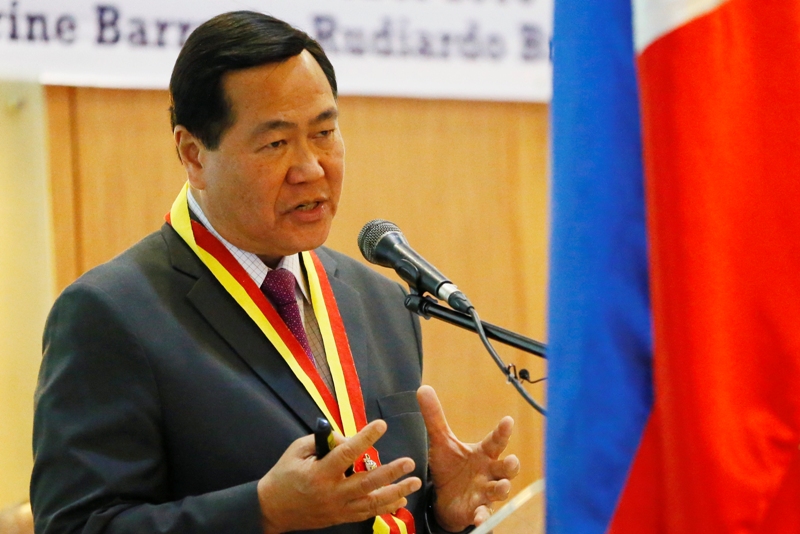‘Philippines can bring China war threat before UN’

“The threat of China to go to war against the Philippines if the Philippines extracts oil and gas in the Reed Bank, or in any area within the Philippine EEZ (exclusive economic zone) in the West Philippine Sea, is a gross violation of the United Nations Charter, UNCLOS and the Treaty of Amity and Cooperation in Southeast Asia to which China and the Philippines are parties,” Carpio said. AP/Bullit Marquez/ File
MANILA, Philippines - Supreme Court (SC) Senior Associate Justice Antonio Carpio has advised the Duterte government to elevate to the United Nations Convention on the Law of the Sea (UNCLOS) Chinese President Xi Jinping’s threat of war against the Philippines should the latter insist on drilling for oil in the disputed South China Sea, or the West Philippine Sea.
“The threat of China to go to war against the Philippines if the Philippines extracts oil and gas in the Reed Bank, or in any area within the Philippine EEZ (exclusive economic zone) in the West Philippine Sea, is a gross violation of the United Nations Charter, UNCLOS and the Treaty of Amity and Cooperation in Southeast Asia to which China and the Philippines are parties,” Carpio said.
Since the Philippine Constitution renounces war as an instrument of national policy, one of the Duterte administration’s options is to bring China’s threat of war to another UNCLOS arbitral tribunal.
It could also secure an order directing China to comply with the ruling of the UNCLOS arbitral tribunal that declared Recto (Reed) Bank part of Philippine EEZ.
Recto Bank is vital to Philippine national interest, as it is the only replacement for Malampaya, which supplies 40 percent of the energy requirement of Luzon.
The Philippines can also ask for damages for every day of delay that the Philippines is prevented by China from exploiting Philippine EEZ.
Another option, according to Carpio, is to report China’s threat of war before the UN General Assembly by sponsoring a resolution condemning China’s threat of war against the Philippines and demanding that China comply with the ruling of the UNCLOS arbitral tribunal.
China, he pointed out, has no veto in the General Assembly.
Carpio also said that the UN Charter outlaws the use or threat of force to settle disputes against states.
Since a threat has been issued, Carpio called on the Filipino people to stand united and defend the West Philippine Sea in accordance with the Constitution, international law and the UNCLOS.
“China’s threat of war against the Philippines over the West Philippine Sea reveals the aggressive design of China against the Philippines. No less than Chinese President Xi Jingping has delivered the threat personally to Philippine President Rodrigo Duterte,” Carpio said.
“An arbitral tribunal…has already ruled with finality that the Reed Bank is within the EEZ of the Philippines and only the Philippines can exploit the natural resources within Philippine EEZ,” Carpio said, as he reminded the Philippine government to protect the nation’s maritime wealth in its EEZ, as mandated by the Constitution.
Since the Philippines cannot resort to war, the President has the constitutional duty to use all legal means under international law to protect the country’s EEZ.
“(T)he President cannot simply do nothing, or worse, acquiesce to China’s action, for inaction is the opposite of protecting Philippine EEZ,” Carpio, an expert on the issue, said.
Under international law, acquiescence is the inaction of a state in the face of threat to its rights under circumstances calling for objection to the threat to its rights; thus, the Philippines will lose forever its EEZ in the West Philippine Sea to China.
Carpio suggested that the country strengthen its ties with its defense alliances, particularly with the United States, since it is the only country with which the Philippines has a Mutual Defense Treaty.
“The Philippines can ally with the United States because the United States does not claim the West Philippine Sea or any Philippine territory,” he said.
‘Chinese propagandist’
For Magdalo party-list group Rep. Gary Alejano, Duterte acts like a Chinese propagandist on the territorial dispute.
Alejano, author of the dismissed impeachment complaint against Duterte, yesterday said he does not believe that the President directly raised the issue on the dispute with Xi.
“We did not hear that from his Chinese counterpart,” he said, referring to Duterte’s statements made in Davao City, where the President revealed Xi’s war threat.
Alejano said Duterte raises hell whenever the US and the European Union reminds him about human rights and adherence to the rule of law.
“But he is a meek lamb in front of Chinese officials,” Alejano said, adding that Duterte’s statements “are a justification of his subservience to China.”
“He is selling us out,” he said.
Envoys divided
Former Philippine ambassador to the Association of Southeast Asian Nations (ASEAN) Wilfredo Villacorta, however, said Duterte properly handled the crafting of the chairman’s statement during the leaders’ summit of the ASEAN member-states in Manila last month.
“There was no need to mention the arbitral ruling in the sections on the South China Sea. The ruling is now part of international law and we can always invoke it as part of international law jurisprudence,” Villacorta told The STAR.
“The specific provisions on the South China Sea in the latter part of the chairman’s statement recognized the importance of maintaining freedom of navigation and over-flight in and above the South China Sea,” he added.
But for former Philippine ambassador to the UN Lauro Baja Jr., Duterte could have handled the summit leaders’ meeting more aggressively.
“He is chairman and in our past experiences, it is the chairman (who) sets the tone,” he told reporters during the launch of a book on ASEAN at the University of the Philippines on Friday.
“It’s not the chairman’s statement, it’s the Chinese statement,” he added.
Baja also expressed doubts that the code of conduct that is being crafted to address the territorial dispute in the South China Sea could resolve the decades-long conflict in the region.
“If the code of conduct will not have a so-called enforcement provision and will not have a dispute mechanism, it will again be in the nature of political declaration,” he said.
Former foreign affairs secretary Albert del Rosario said China’s threat of war is Beijing’s strong statement that it does not honor the arbitral ruling.
“The utterance…clearly demonstrates to the world China’s position regarding the arbitral tribunal outcome that is consistent with UNCLOS,” Del Rosario said.
“Contrary to our position that right is might, China has strongly declared that it is might that will triumph what is right,” Del Rosario said. “China – unless it stands to benefit – does not intend to respect the rule of law,” he added. – With Jess Diaz, Janvic Mateo, Pia Lee-Brago
- Latest
- Trending































